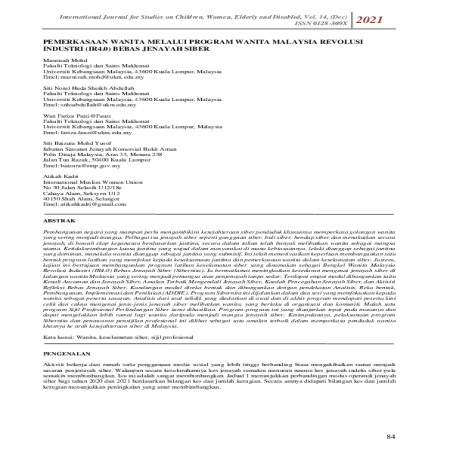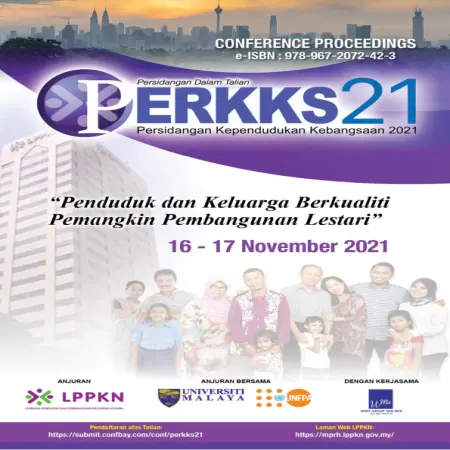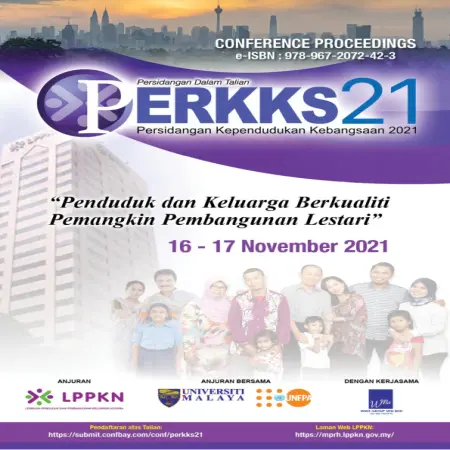PUBLICATIONS
|
|
Pendekatan kaunseling disermen dalam menangani konflik perkahwinan era pendemik covid-19
Item Type: Article
Editor:
Year: 00/12/2021
Abstract: Marital conflict management in a quality manner is necessary considering the functionality of the husband and wife is the backbone
to marital bliss. In this paper, the use of the 'Pendekatan Kaunseling Disermen' introduced by William J. Doherty is proposed to be used during counseling sessions involving couples where one party tends to stay and the other tends to divorce, especially in the era of the COVID-19 pandemic.
|
|
|
|
|
|
Penghayatan islam dan hubungannya terhadap pengabaian qawwamah dalam perkahwinan
Item Type: Article
Editor:
Year: 00/12/2021
Abstract: Qawwamah in marriage is an issue that is often raised when there is domestic conflict. Neglect of qawwamah by the husband will have very big implications for the wife. The emergence of domestic dysfunction is due to the problem of leadership that is not based on the appreciation of Islam. Harmony and happiness are difficult to form without the implementation of Islamic practices applied in household institutions. This study suggests that the appreciation of Islam be used as a model in fostering household leadership that is free from conflict in creating a harmonious and calm atmosphere.
|
|
|
|
|
|
Program dan aktiviti warga emas satu kajian di pusat aktiviti warga emas (PAWE) Negeri Kedah
Item Type: Article
Editor:
Year: 00/12/2021
Abstract: For the State of Kedah, the aging status based on statistics up to now is 12.6% of the elderly population based on the total population in the State of Kedah of 2.2 million people. In accordance with the wishes of the Federal Government, it is necessary to establish every PAWE in every Parliament to draft and enable the elderly to always be active in the State of Kedah. In the State of Kedah there are 12 PAWEs representing 12 Parliamentary constituencies and this study will look at the involvement of the elderly in activities and programs that successfully attract their interests and tendencies. At the end of the study, the researcher will state the need for such a program as an example among the elderly and be used as a guide in the future.
|
|
|
|
|
|
Poverty in marginal communities: factors, cultures and counseling intervention strategies for the poor and homeless
Item Type: Article
Editor:
Year: 00/12/2021
Abstract: This article discusses the poverty faced by two marginal groups in Malaysia, namely the destitute and the homeless in Malaysia. This article covers the concept of poverty in Malaysia, the factors of poverty, the theory and culture of poverty, and the government's efforts in helping the marginalized. In addition, there is a discussion on the new classification of households issued by the Department of Statistics Malaysia in 2020. The government can more accurately identify the household income range to formulate and plan the assistance that needs to be channeled to specific groups in need.
|
|
|
|
|
|
Pencetus utama konflik perkahwinan sepanjang fasa pertama perkahwinan dalam kalangan pasangan muda: kajian kes semasa Perintah Kawalan Pergerakan (PKP)
Item Type: Article
Editor:
Year: 00/12/2021
Abstract: The first phase of marriage is often associated with a crisis phase, an adjustment phase and a stress phase. The success of the young couple through this phase will guarantee the stability of the marriage and the survival of the family institution. Divorce is a major threat to young couples in the early phase of marriage. This study aims to identify triggers of marital conflict during the first phase of marriage (1-10 years) among young couples in the State of Selangor. The results of the analysis show that there are three 93) main triggers of marital conflict among young couples, namely financial crisis, communication problems and family interference.
|
|
|
|
|
|
Pemerkasaan wanita melalui program wanita Malaysia Revolusi Industri (IR4.0) bebas jenayah siber
Item Type: Article
Editor:
Year: 00/12/2021
Abstract: Sustainable national development needs to take into account the cyber well-being of the population, especially empowering women who are often the victims. Various cybercrime issues such as cyber harassment, cyberbullying, cyber stalking and criminal intimidation, under the scope of gender-based violence, online have largely involved women as primary victims. The gender power imbalance that exists in a society where usually, men are considered the dominant gender while women are considered the submissive gender. This has motivated the need to develop a form of training program that focuses on gender equality and women’s empowerment in cyber security. Therefore, this study aims to develop a cyber security training program called the Bengkel Wanita Malaysia Revolusi Industri (IR4.0) Bebas Jenayah Siber (Sibernita).
|
|
|
|
|
|
Perceraian dalam kalangan wanita Melayu Terengganu
Item Type: Article
Editor:
Year: 00/12/2021
Abstract: This article analyzes the issue of divorce claims among Terengganu Malay women. Writing from a social history perspective, focusing on the period from 1963 to 1978 based on the written report of the Besut Kadhi Office obtained at the National Archives of Malaysia Terengganu Branch. The discussion of this article is divided into three parts. First, about background such as place of origin, age, length of time left, marital and family status and partner's occupation. Second, explain the factors that cause women to make complaints to religious parties that are related to the problem of neglecting alimony and responsibilities, polygamy and disappearing for a certain period of time. Third, removing the constraints faced such as hard-to-find couples who have migrated from their original area to a new place outside Terengganu or to another district in Terengganu as well as marriage with a partner from outside Terengganu. The findings of the study show that the Kadhi Besut Office plays an important role in solving problems related to the status of women who are suspended without strings. This study is expected to be able to fill the void in writing about Malaysian social history in general and gender studies in particular in the post-independence era.
|
|
|
|
|
|
Peranan dan tanggungjawab masyarakat terhadap rumah kebajikan kanak-kanak
Item Type: Article
Editor:
Year: 00/12/2021
Abstract: This article tries to discuss the role of society on the lives of children in welfare home and the sustainability of welfare homes. For this purpose, the researcher has made more than 70 visits to Children’s Welfare Homes (Residential – Private/NGO). It involves 35 institutions covering eight districts in Selangor. This discussion is based on data from questionnaires, interviews and observations during visits. Interviews involve the highest administrators of the institution while monitoring the institution’s environment is a direct response through volunteer activities at the institution. The proposals presented are limited to the role of educational institutions and state welfare agencies.
|
|
|
|
|
|
Pengukuhan capaian vaksinasi HPV melalui perkhidmatan di Klinik Nur Sejahtera LPPKN: Suatu gambaran umum
Item Type: Book Section
Editor:
Year: 01/12/2021
Abstract: In Malaysia, Cervical Cancer remains among the top three most common cancers among women aged 15 to 44 years. Although the Malaysian Ministry of Health (MOH) has developed the Human Papillomavirus (HPV) Vaccination Program since 2007, the level of vaccination reach involving target groups in the country is still at a moderate level and not yet comprehensive. In support of efforts to ensure women’s reproductive health and well-being, the National Population and Family Development Board (NPFDB), an agency under the Ministry of Women, Family and Community Development has implemented an HPV vaccination program through Klinik Nur Sejahtera (KNS) nationwide.
|
|
|
|
|
|
Pencetus utama konflik perkahwinan sepanjang fasa pertama perkahwinan dalam kalangan pasangan muda: Kajian kes semasa Perintah Kawalan Pergerakan (PKP)
Item Type: Book Section
Editor:
Year: 01/12/2021
Abstract: The first phase of marriage is often associated with a crisis phase, an adjustment phase and a stress phase. The success of the young couple through this phase will ensure the stability of the marriage and the survival of the family institution. Divorce is a major threat to young couples in the first phase of marriage. This study aims to identify the triggers of marital conflict during the first phase of marriage (1-10 years) among young couples in the State of Selangor.
|
|
|
|














